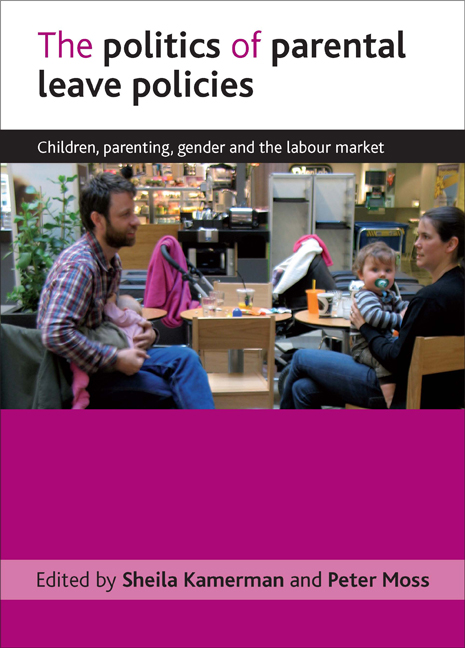Book contents
- Frontmatter
- Contents
- List of tables and figures
- Acknowledgements
- Notes on contributors
- one Introduction
- two Australia: the difficult birth of paid maternity leave
- three Canada and Québec: two policies, one country
- four Czech Republic: normative or choice-oriented system?
- five Estonia: halfway from the Soviet Union to the Nordic countries
- six Finland: negotiating tripartite compromises
- seven France: gender equality a pipe dream?
- eight Germany: taking a Nordic turn?
- nine Hungary and Slovenia: long leave or short?
- ten Iceland: from reluctance to fast-track engineering
- eleven The Netherlands: bridging labour and care
- twelve Norway: the making of the father’s quota
- thirteen Portugal and Spain: two pathways in Southern Europe
- fourteen Sweden: individualisation or free choice in parental leave?
- fifteen The European directive: making supra-national parental leave policy
- sixteen Conclusion
- Appendix
- Index
sixteen - Conclusion
Published online by Cambridge University Press: 05 July 2022
- Frontmatter
- Contents
- List of tables and figures
- Acknowledgements
- Notes on contributors
- one Introduction
- two Australia: the difficult birth of paid maternity leave
- three Canada and Québec: two policies, one country
- four Czech Republic: normative or choice-oriented system?
- five Estonia: halfway from the Soviet Union to the Nordic countries
- six Finland: negotiating tripartite compromises
- seven France: gender equality a pipe dream?
- eight Germany: taking a Nordic turn?
- nine Hungary and Slovenia: long leave or short?
- ten Iceland: from reluctance to fast-track engineering
- eleven The Netherlands: bridging labour and care
- twelve Norway: the making of the father’s quota
- thirteen Portugal and Spain: two pathways in Southern Europe
- fourteen Sweden: individualisation or free choice in parental leave?
- fifteen The European directive: making supra-national parental leave policy
- sixteen Conclusion
- Appendix
- Index
Summary
Why a focus on parental leave policies?
This is a book about public policies targeted at young children, mainly but not exclusively under 3 years of age, and their families, and that treat parenting as a core issue for child, family and employment policies. Parental leave policies incorporate responses to multiple concerns, including economic support of families with very young children; protection of maternal and child health, pregnancy and childbirth; promotion of maternal employment; gender equality in the labour market and home; support for parental time with children (both fathers and mothers); involvement of parents in infants’ care; and efforts to ensure that babies start their growth and development in decent circumstances.
Leading child development experts continuously and unambiguously stress the importance of the first few years of life (Shonkoff and Phillips, 2000). But only recently have policies targeted at children under 3 years of age and their families become an important focus of public policy. The increased attention to this age group and their care is due to the efforts of scholars (such as Kamerman and Kahn, 1991; Ruhm, 1998; Moss and Deven, 1999; Shonkoff and Phillips, 2000; Tanaka, 2005), national and international organisations (such as the influential US national organisation Zero To Three, the International Labour Organization (ILO) and the Organisation for Economic Co-operation and Development (OECD)) and European Union (EU) policy initiatives, including those announced at the European Council and Commission meetings in Lisbon in 2000 and Barcelona in 2002 .
The EU has shown a consistent policy interest in both leave and early childhood education and care, driven by employment and gender equality goals. But this has gained new impetus in the 21st century. At the Lisbon summit in March 2000, EU leaders set out a new strategy, based on a consensus among member states, to modernise Europe. This became known as the ‘Lisbon Strategy’ and was simplified and relaunched in 2005. A major focus of the Lisbon Strategy was on increasing employment, including an explicit target of raising the rate of female employment from an EU average of 51% in 2000 to 60% by 2010 (Plantenga and Siegel, 2004). When the European Council and Commission met in Barcelona in 2002, participants identified several priority actions for the achievement of these employment targets and for achieving greater gender equity.
- Type
- Chapter
- Information
- The Politics of Parental Leave PoliciesChildren, Parenting, Gender and the Labour Market, pp. 259 - 272Publisher: Bristol University PressPrint publication year: 2009



